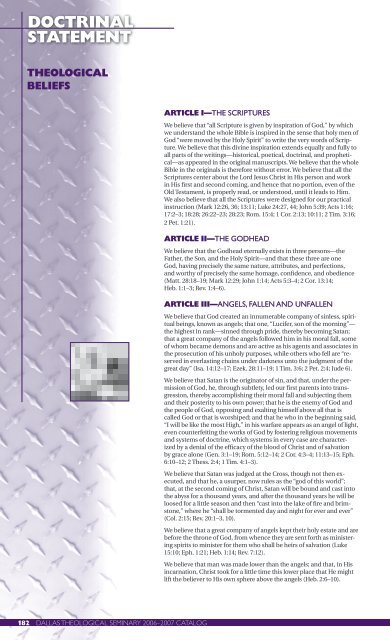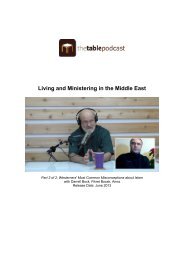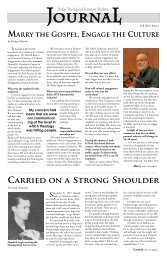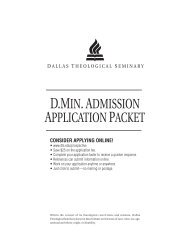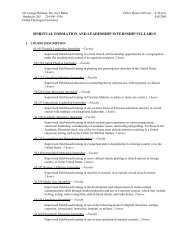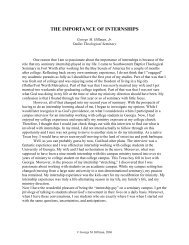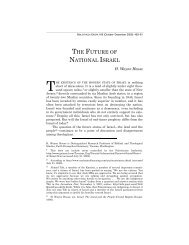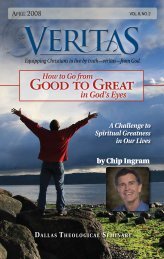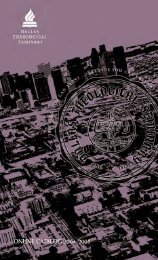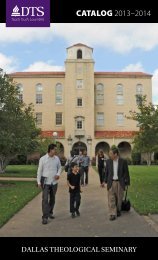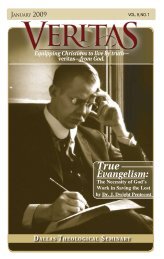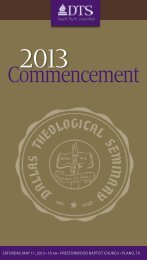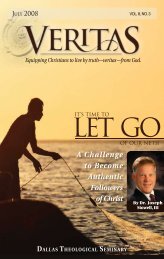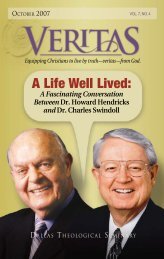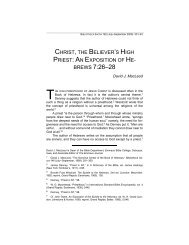Academic Programs - Dallas Theological Seminary
Academic Programs - Dallas Theological Seminary
Academic Programs - Dallas Theological Seminary
You also want an ePaper? Increase the reach of your titles
YUMPU automatically turns print PDFs into web optimized ePapers that Google loves.
DOCTRINAL<br />
STATEMENT<br />
THEOLOGICAL<br />
BELIEFS<br />
ARTICLE I—THE SCRIPTURES<br />
We believe that “all Scripture is given by inspiration of God,” by which<br />
we understand the whole Bible is inspired in the sense that holy men of<br />
God “were moved by the Holy Spirit” to write the very words of Scripture.<br />
We believe that this divine inspiration extends equally and fully to<br />
all parts of the writings—historical, poetical, doctrinal, and prophetical—as<br />
appeared in the original manuscripts. We believe that the whole<br />
Bible in the originals is therefore without error. We believe that all the<br />
Scriptures center about the Lord Jesus Christ in His person and work<br />
in His first and second coming, and hence that no portion, even of the<br />
Old Testament, is properly read, or understood, until it leads to Him.<br />
We also believe that all the Scriptures were designed for our practical<br />
instruction (Mark 12:26, 36; 13:11; Luke 24:27, 44; John 5:39; Acts 1:16;<br />
17:2–3; 18:28; 26:22–23; 28:23; Rom. 15:4; 1 Cor. 2:13; 10:11; 2 Tim. 3:16;<br />
2 Pet. 1:21).<br />
ARTICLE II—THE GODHEAD<br />
We believe that the Godhead eternally exists in three persons—the<br />
Father, the Son, and the Holy Spirit—and that these three are one<br />
God, having precisely the same nature, attributes, and perfections,<br />
and worthy of precisely the same homage, confidence, and obedience<br />
(Matt. 28:18–19; Mark 12:29; John 1:14; Acts 5:3–4; 2 Cor. 13:14;<br />
Heb. 1:1–3; Rev. 1:4–6).<br />
ARTICLE III—ANGELS, FALLEN AND UNFALLEN<br />
We believe that God created an innumerable company of sinless, spiritual<br />
beings, known as angels; that one, “Lucifer, son of the morning”—<br />
the highest in rank—sinned through pride, thereby becoming Satan;<br />
that a great company of the angels followed him in his moral fall, some<br />
of whom became demons and are active as his agents and associates in<br />
the prosecution of his unholy purposes, while others who fell are “reserved<br />
in everlasting chains under darkness unto the judgment of the<br />
great day” (Isa. 14:12–17; Ezek. 28:11–19; 1 Tim. 3:6; 2 Pet. 2:4; Jude 6).<br />
We believe that Satan is the originator of sin, and that, under the permission<br />
of God, he, through subtlety, led our first parents into transgression,<br />
thereby accomplishing their moral fall and subjecting them<br />
and their posterity to his own power; that he is the enemy of God and<br />
the people of God, opposing and exalting himself above all that is<br />
called God or that is worshiped; and that he who in the beginning said,<br />
“I will be like the most High,” in his warfare appears as an angel of light,<br />
even counterfeiting the works of God by fostering religious movements<br />
and systems of doctrine, which systems in every case are characterized<br />
by a denial of the efficacy of the blood of Christ and of salvation<br />
by grace alone (Gen. 3:1–19; Rom. 5:12–14; 2 Cor. 4:3–4; 11:13–15; Eph.<br />
6:10–12; 2 Thess. 2:4; 1 Tim. 4:1–3).<br />
We believe that Satan was judged at the Cross, though not then executed,<br />
and that he, a usurper, now rules as the “god of this world”;<br />
that, at the second coming of Christ, Satan will be bound and cast into<br />
the abyss for a thousand years, and after the thousand years he will be<br />
loosed for a little season and then “cast into the lake of fire and brimstone,”<br />
where he “shall be tormented day and night for ever and ever”<br />
(Col. 2:15; Rev. 20:1–3, 10).<br />
We believe that a great company of angels kept their holy estate and are<br />
before the throne of God, from whence they are sent forth as ministering<br />
spirits to minister for them who shall be heirs of salvation (Luke<br />
15:10; Eph. 1:21; Heb. 1:14; Rev. 7:12).<br />
We believe that man was made lower than the angels; and that, in His<br />
incarnation, Christ took for a little time this lower place that He might<br />
lift the believer to His own sphere above the angels (Heb. 2:6–10).<br />
182 DALLAS THEOLOGICAL SEMINARY 2006–2007 CATALOG


